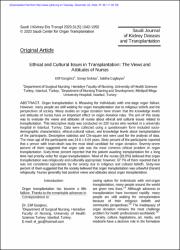| dc.contributor.author | Gezginci, Elif | |
| dc.contributor.author | Baltacı Göktaş, Sonay | |
| dc.contributor.author | Çaǧlayan, Sabiha | |
| dc.date.accessioned | 2020-12-22T10:24:18Z | |
| dc.date.available | 2020-12-22T10:24:18Z | |
| dc.date.issued | 2020 | en_US |
| dc.identifier.citation | Gezginci, E., Baltacı Göktaş, S. ve Çaǧlayan, S. (2020). Ethical and cultural issues in transplantation: The views and attitudes of nurses. Saudi Journal of Kidney Diseases and Transplantation, 31(5), 1042-1050. https://dx.doi.org/10.4103/1319-2442.301169 | en_US |
| dc.identifier.issn | 1319-2442 | |
| dc.identifier.uri | https://dx.doi.org/10.4103/1319-2442.301169 | |
| dc.identifier.uri | https://hdl.handle.net/20.500.12511/6130 | |
| dc.description.abstract | Organ transplantation is lifesaving for individuals with end-stage organ failure. However, many people are still waiting for organ transplantation due to religious beliefs and the perspectives of society. Many studies on organ donation have shown that the knowledge levels and attitudes of nurses have an important effect on organ donation rates. The aim of this study was to evaluate the views and attitudes of nurses about ethical and cultural issues related to transplantation. This descriptive study was conducted on 220 nurses who worked in a university hospital in Istanbul, Turkey. Data were collected using a questionnaire form included sociodemographic characteristics, ethical-cultural values, and knowledge levels about transplantation of the participants. Descriptive statistics and Chi-square test were used for the analysis of data. The mean age of the participants was 24.8 ± 6.04 years. Sixty percent of the participants reported that a person with brain-death was the most ideal candidate for organ donation. Seventy-seven percent of them suggested that organ sale was the most common ethical problem in organ transplantation. Sixty-three percent reported that the patient awaiting transplantation for a long time had priority order for organ transplantation. Most of the nurses (91.0%) believed that organ transplantation was religiously and culturally appropriate; however, 67.7% of them reported that it was not considered appropriate by the society due to religious and cultural beliefs. Sixty-two percent of them suggested that the society believed that organ transplantation was unlawful (haram) religiously. Nurses generally had positive views and attitudes about organ transplantation. | en_US |
| dc.language.iso | eng | en_US |
| dc.publisher | Wolters Kluwer Medknow Publications | en_US |
| dc.rights | info:eu-repo/semantics/openAccess | en_US |
| dc.subject | Attitudes of Nurses | en_US |
| dc.subject | Views | en_US |
| dc.subject | Cultural Issues | en_US |
| dc.title | Ethical and cultural issues in transplantation: The views and attitudes of nurses | en_US |
| dc.type | article | en_US |
| dc.relation.ispartof | Saudi Journal of Kidney Diseases and Transplantation | en_US |
| dc.department | İstanbul Medipol Üniversitesi, Sağlık Bilimleri Fakültesi, Hemşirelik Bölümü | en_US |
| dc.identifier.volume | 31 | en_US |
| dc.identifier.issue | 5 | en_US |
| dc.identifier.startpage | 1042 | en_US |
| dc.identifier.endpage | 1050 | en_US |
| dc.relation.publicationcategory | Makale - Uluslararası Hakemli Dergi - Kurum Öğretim Elemanı | en_US |
| dc.identifier.doi | 10.4103/1319-2442.301169 | en_US |
| dc.identifier.scopusquality | Q3 | en_US |


















